
Editor's note: This is the 48th article in the COVID-19 Global Roundup series. Here is the previous one.
Countries from Italy to New Zealand have announced the easing of coronavirus lockdowns but British Prime Minister Boris Johnson, back at work on Monday after being in intensive care with the disease, said it was too soon to relax the restrictions.
Nearly three million people have been infected by the coronavirus across the world and 205,948 have died, according to a Reuters tally of official figures. But many countries are looking to ease lockdowns as rates of infections fall and fears of economic ruin rise.
The world's worst pandemic in a century, which was reported in China in December, has forced a dilemma upon governments. People cooped up in their homes for weeks on end are growing frustrated and anxious about what the future holds.
And with economic activity from shops and bars to factories and tourism curtailed, prolonged recessions are forecast for many countries.
But with no antidote yet found for the coronavirus, leaders are also acutely aware that a second wave of infections could sweep over their countries just as life gets back to some kind of normal.
Australia's most populous state said on Tuesday it will relax some restrictions on movement, as beaches reopened amid hopes a policy of widespread medical testing will help sustain a decline in new cases of the coronavirus.
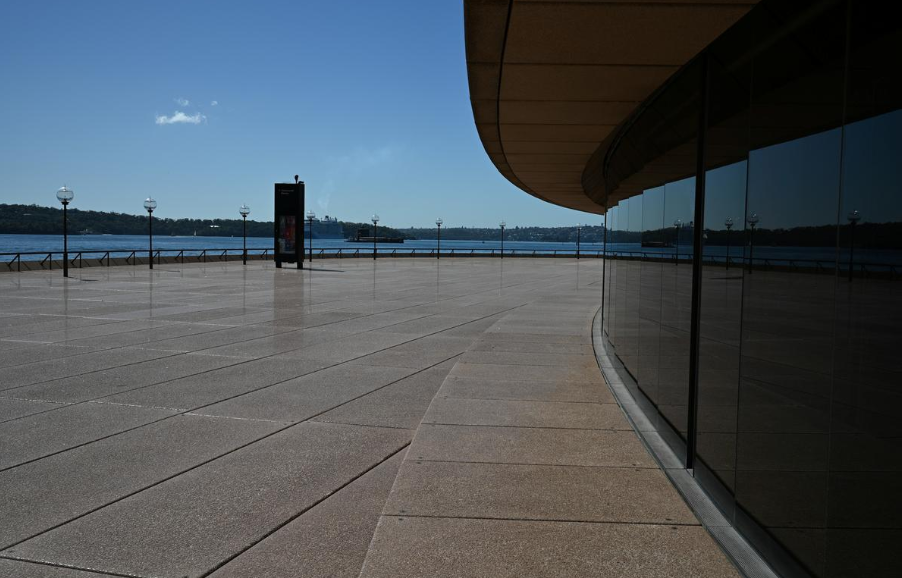
Sydney Opera House, where scheduled public performances have been cancelled due to COVID-19, is seen in Sydney, Australia, March 18, 2020. /Reuters
Sydney Opera House, where scheduled public performances have been cancelled due to COVID-19, is seen in Sydney, Australia, March 18, 2020. /Reuters
Bondi Beach and two neighboring beaches in Sydney were reopened to local residents on Tuesday after being closed a month ago due to large crowds breaking social distancing rules.
New South Wales (NSW) state, which is home to nearly half of Australia's roughly 6,700 cases of COVID-19, said it would let up to two adults visit another person's home from Friday, relaxing a stay-at-home policy and ban on non-essential movement.
Australia, which closed its external and internal borders, imposed an early shutdown of businesses, and issued strict social distancing rules, has avoided the high numbers of coronavirus cases and deaths seen in other countries.
Australian states are starting to relax some restrictions as the local rate of new infections slows to barely one percent per day, compared to 25 percent a month ago. The country has recorded 84 deaths associated with the virus.
Nigeria said on Monday it will begin a "phased and gradual" easing of more than four weeks of lockdowns in the national capital and the largest city on May 4.
Lagos and Ogun states and the federal capital territory of Abuja entered lockdowns to tame the spread of the new coronavirus on March 30.
Italy, which has the world's second-highest number of coronavirus deaths at more than 26,000, will allow factories and building sites to reopen from May 4 and permit limited family visits as it prepares a staged end to Europe's longest coronavirus lockdown, Prime Minister Giuseppe Conte said on Sunday.
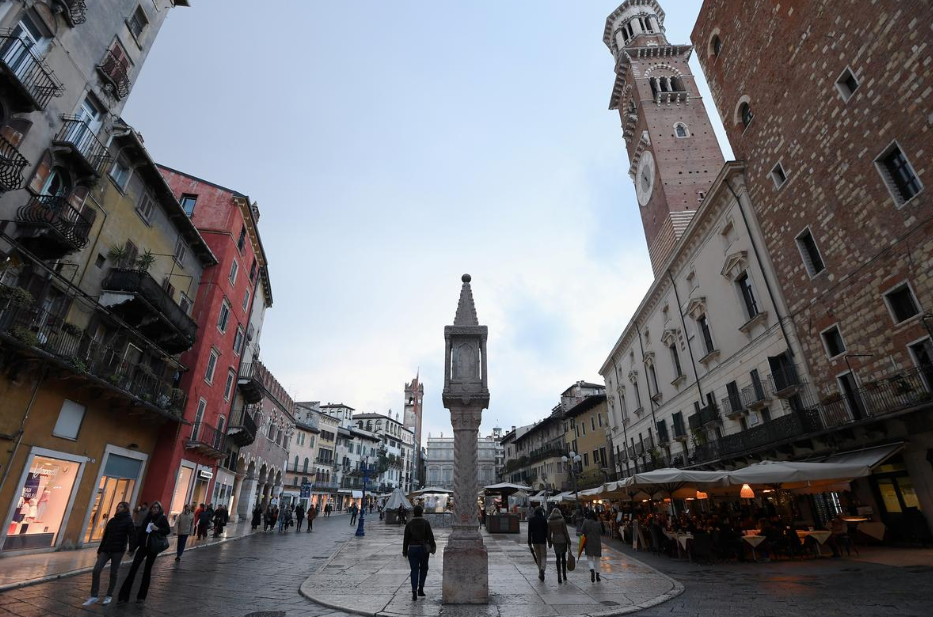
Piazza delle Erbe, virtually deserted as Italy battles a coronavirus outbreak, in Verona, Italy, March 7, 2020. /Reuters
Piazza delle Erbe, virtually deserted as Italy battles a coronavirus outbreak, in Verona, Italy, March 7, 2020. /Reuters
Italy is looking ahead to a second phase of the crisis in which it will attempt to restart the economy without triggering a new wave of infections.
"We expect a very complex challenge," Conte said. "We will live with the virus and we will have to adopt every precaution possible."
New Zealanders will be able to go fishing, surfing, hunting and hiking this week for the first time in more than a month as it begins to ease its way out of a strict lockdown.
About 400,000 people will return to work after the country shifts its alert level down a notch at midnight on Monday, but shops and restaurants will remain closed.
Offices, schools, bars and restaurants, including take away and delivery services, had been closed since March 26.
In Norway, schoolchildren from first to fourth grades returned to classes for the first time since mid-March, while a range of small businesses, including hairdressers, were allowed to open.
"I feel like a burden has been lifted," said Abi Qadar, a 36-year-old artist, after dropping off his seven-year-old daughter at school in central Oslo. "It was tough."
Germany's economy minister urged its 16 states on Monday to reopen slowly. As the number of new infections has fallen, many businesses like smaller stores or car dealerships have been allowed to reopen and some students are returning to schools.
Spain cautiously prepared further steps to loosen one of Europe's toughest coronavirus lockdowns on Monday and played down concerns that letting children outside after six weeks had led to crowds forming in public spaces.
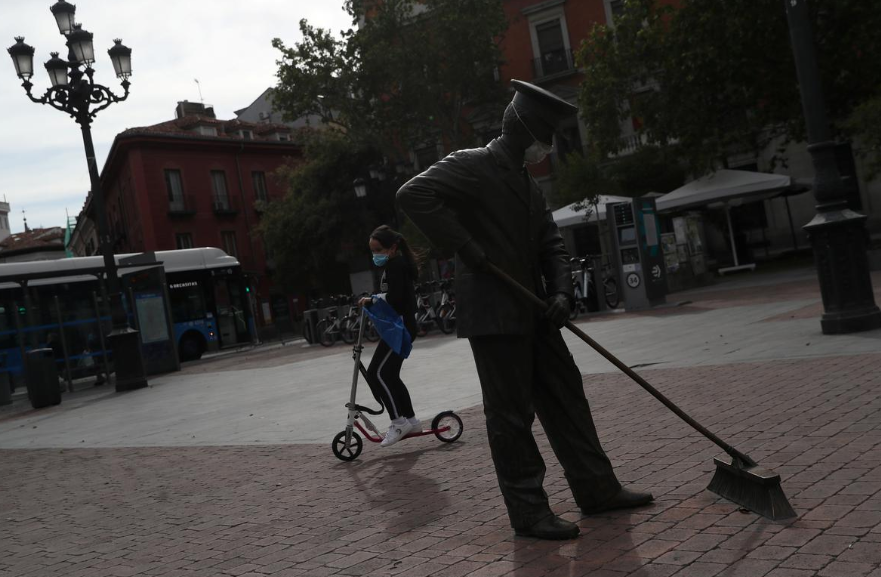
A girl rides a scooter past a statue wearing a protective mask after restrictions were partially lifted for children for the first time during lockdown, amid the coronavirus outbreak, in Madrid, Spain, April 27, 2020. /Reuters
A girl rides a scooter past a statue wearing a protective mask after restrictions were partially lifted for children for the first time during lockdown, amid the coronavirus outbreak, in Madrid, Spain, April 27, 2020. /Reuters
Having suffered one of the world's deadliest outbreaks, Spain has been under strict lockdown since March 14, but recently began to ease restrictions as it reined in the infection rate.
Turkish President Recep Tayyip Erdogan said on Monday his government was planning to ease COVID-19 restrictions, but warned that weekend lockdowns would most likely continue until after the end of Ramadan.
Belgium has already reopened gardening and DIY centers, and is starting a wider, gradual easing from May 4. Switzerland started easing restrictions, with people getting haircuts and visiting dentists again, as queues formed at garden centers.
Israel on Sunday allowed some businesses to reopen and said it was considering letting children return to school.
Romania said it would not extend the current state of emergency past May 15, when people will be able to move around with documentation.
Britain's prime minister, speaking outside his Downing Street residence a month and a day since testing positive for the virus, compared the disease to a street criminal that the British people had wrestled to the floor.
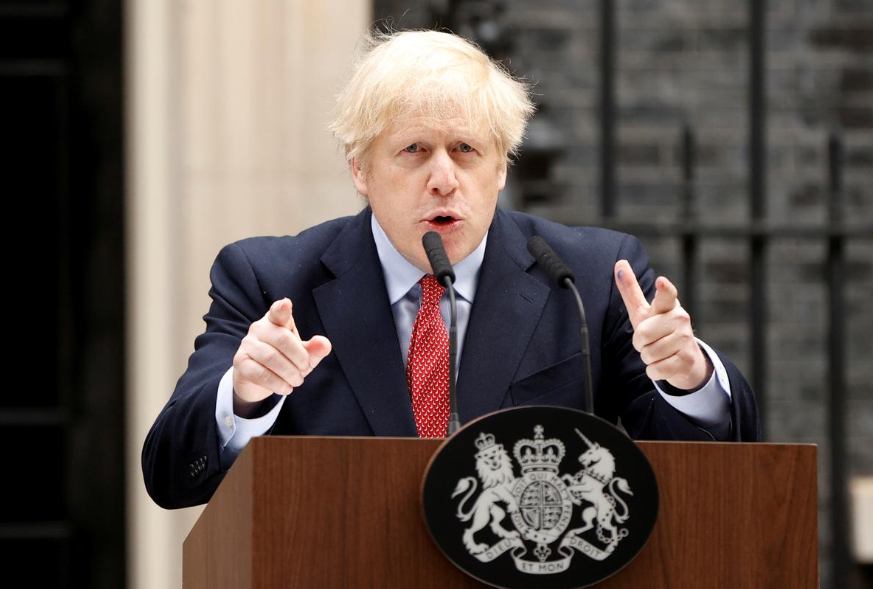
Britain's Prime Minister Boris Johnson speaks outside 10 Downing Street after recovering from COVID-19, London, Britain, April 27, 2020. /Reuters
Britain's Prime Minister Boris Johnson speaks outside 10 Downing Street after recovering from COVID-19, London, Britain, April 27, 2020. /Reuters
Johnson, 55, who spent three nights in intensive care at a public hospital in London, said he understood the concerns of business and would consult with opposition parties – but he made clear that there was to be no swift lifting of the lockdown.
"If we can show the same spirit of unity and determination as we've all shown in the past six weeks, then I have absolutely no doubt that we will beat it," he said.
But he did say the government would outline plans for an easing of curbs in the coming days.
The government has come under criticism from the opposition Labour Party for its slow response, especially in testing and ensuring enough protective equipment for frontline workers.
In the United States, which has recorded the world's highest infection and death tolls, critics have accused President Donald Trump of mixed and confusing messages on the coronavirus as states have bickered with the White House over how to handle the outbreak and when to reopen the economy.
Georgia, Oklahoma and several other states took tentative steps at restarting businesses on Friday, despite disapproval from Trump and medical experts.
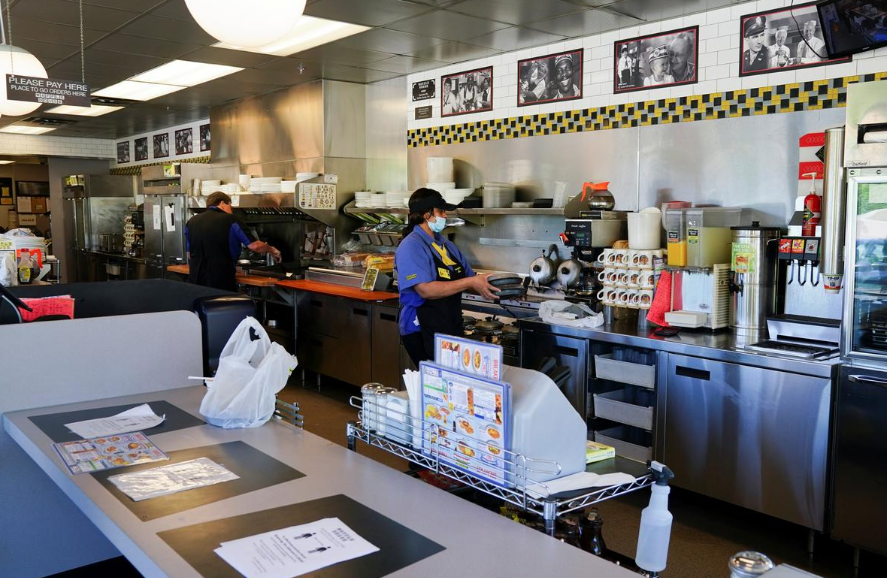
An employee bags up an order right before closing at a Waffle House on the day restaurants and theaters were allowed to reopen to the public as part of the phased reopening of businesses and restaurants from the coronavirus restrictions in Smyrna, Georgia, U.S., April 27, 2020. /Reuters
An employee bags up an order right before closing at a Waffle House on the day restaurants and theaters were allowed to reopen to the public as part of the phased reopening of businesses and restaurants from the coronavirus restrictions in Smyrna, Georgia, U.S., April 27, 2020. /Reuters
New York, the hardest-hit state in the country, plans to extend stay-at-home order beyond May 15 in many parts of the state, but Governor Andrew Cuomo said on Monday that restrictions could be relaxed in some regions if they have sufficient hospital capacity and meet other criteria.
Source(s): Reuters